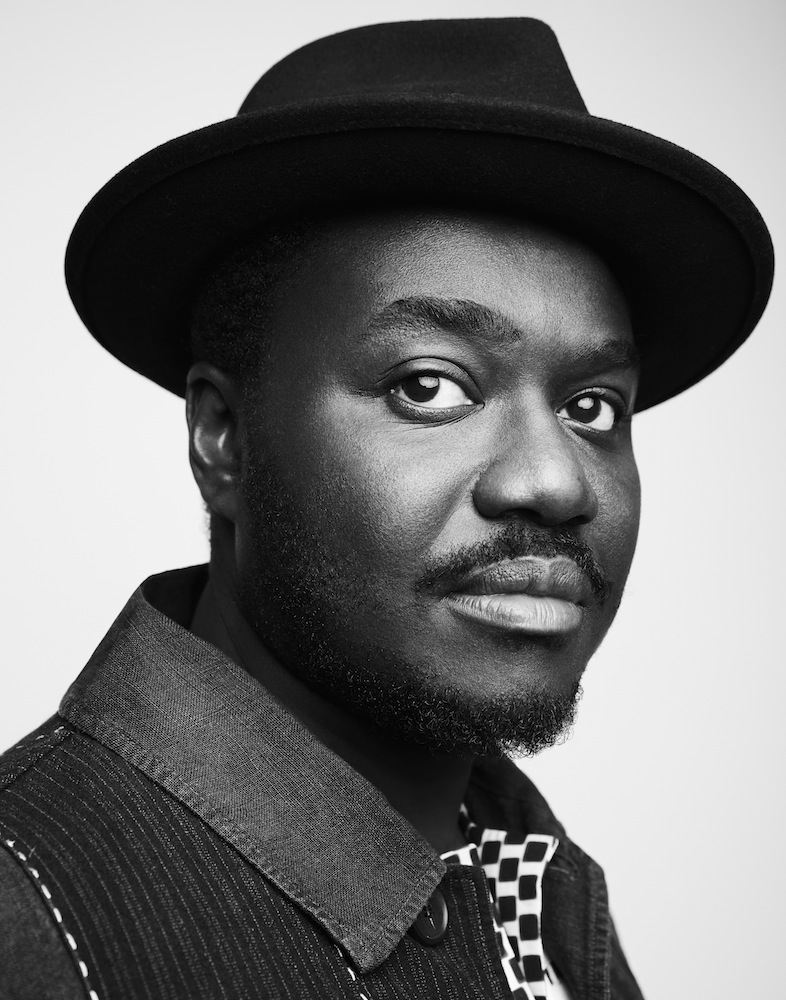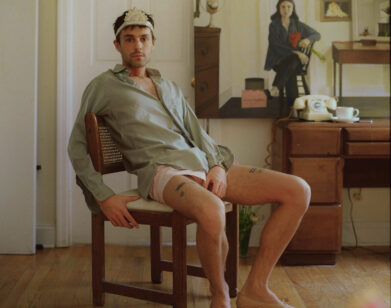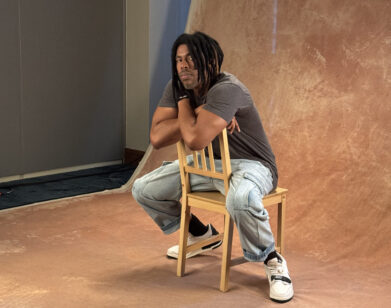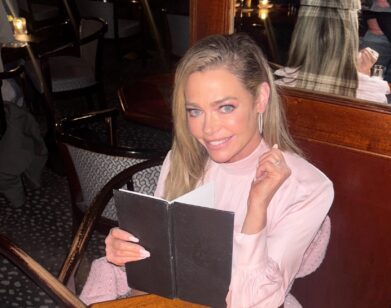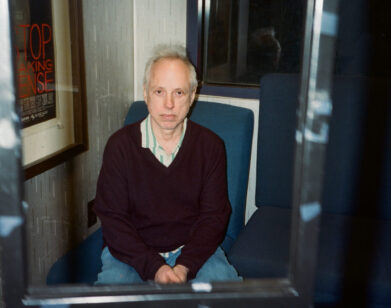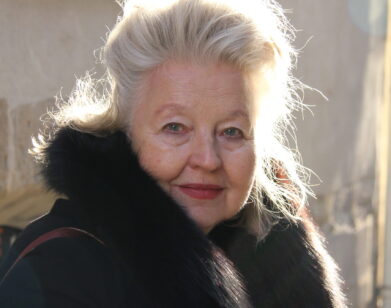Babou Ceesay
BABOU CEESAY IN LONDON, MARCH 2017. PHOTOS: MATT HOLYOAK/KAYTE ELLIS AGENCY. STYLING: NIC JOTTKANDT. GROOMING: LIZ DAXAUER FOR CAREN AGENCY USING ELEMIS GROOMING RANGE. RETOUCHING: THE SHOEMAKER’S ELVES LONDON.
Guerrilla, John Ridley‘s six-part miniseries concluding this Sunday on Showtime, presents an unjust, politically and socially fragmented world that feels uncomfortably relevant. Set in London in 1971, the narrative follows a young couple, Marcus (Babou Ceesay) and Jas (Freida Pinto), as they become increasingly active in fighting for the rights of people of color. The cast of characters is a cross-section of the disenfranchised—from Northern Irish Catholics and IRA members to American Black Power activists, Quebec separatists, Rhodesian revolutionaries, and German socialists—with different ideas regarding how to bring about change. “It’s a six-hour independent film,” says Ceesay.
Born in London in 1978, and raised largely in Gambia in West Africa, Ceesay began his career on stage. Over the last four-odd years, however, roles in Star Wars: Rogue One and indie films like Eye in the Sky, Yann Demange’s ’71, and Ben Wheatley’s Free Fire, have established him as an increasingly in-demand screen actor.
EMMA BROWN: I read that you studied microbiology at Imperial in London. How did you go from that to acting?
BABOU CEESAY: I ended up working in the City after that. They headhunt at universities, so I was working as an internal auditor [at Deloitte] when a phone conversation with a cousin just triggered the idea in my mind. I couldn’t let go of it. I’d always been thinking about it, and at that point, I realized it was something I had to pursue. I thought, “Well, I understand that one in 30 people get places, so I might as well audition and see if I’m one of those people.” When they offered me a place at the Oxford School of Drama, I jumped at it. I moved to Oxford, did a year of training, and came out to be an actor.
BROWN: Was your family concerned about your decision to become an actor?
CEESAY: They weren’t initially concerned. I had really built up the phone conversation I was going to have, but it was just a short, “Good luck.” Some questions, but they trusted me. It was something I’d been passionate about, so we went for it. The concerns came later when you realize how stacked the odds are against you. That’s when my parents started to worry. There I was down a path in the City that was kind of mapped out and clear, and all of a sudden they couldn’t tell what was going to happen next week. They were worried more for me, not for themselves: “We hope you know what you’re doing.” And the thing was I didn’t really. [laughs]
BROWN: Do you come from a pretty creative family?
CEESAY: Yeah, I do. Being in this career, I’ve learned things about my family. My grandfather actually did a bit of acting in Gambia. I was like, “Wow, okay.” I’d never ever heard that. I have a relative who is doing very well in the scene in Senegal. My sister [Ndey Fatou Ceesay] is a fashion designer. A lot of the shirts I wear when I’m out, she’s made. She’s shown at London Fashion Week twice, and done extremely well. She’s got a shop and a brand that’s growing. My mum also made clothes. You don’t realize how much of an effect that has on you. I guess I also watched a lot of films growing up.
BROWN: What sort of films did you watch?
CEESAY: Everything from The Sound of Music and Grease to Midnight Cowboy. I was also really into Bollywood films. Growing up in West Africa, in terms of the supply, you get to see Rocky; you don’t necessarily get to see Gorillas in the Mist. A film like Rocky, it really speaks to the people. But I got to watch Midnight Cowboy, which had a profound effect on me. Things like My Left Foot with Daniel Day-Lewis. Titanic. I think it’s the storytelling, it got to me. I suddenly thought, “What a powerful medium this is.” Here I am, all the way across the world—I guess at the time I didn’t think that, but now I understand it—and it’s having an impact on me. I’m getting to see someone else’s life from across the way or a history or a character or a type of character. And that’s profound. I think I’ve always wanted to be part of that.
BROWN: After you graduated from drama school, what was your first paid role?
CEESAY: I was hired to voice an educational character at a small radio studio in Oxford. I didn’t have an agent; I didn’t have anything. But the principal of my school felt sorry for me and, I think, called them up and said, “I’ve got this actor, he’s not working. I think he’d be great for this.” So I went in and did that and got 125 quid. Frankly speaking, I thought that was very good for a day’s work.
BROWN: When did you get an agent?
CEESAY: Not immediately. In my showcase, I was seen by the assistant to the legendary theater director Max Stafford-Clark who then invited me to audition for a role in Macbeth, the role of Malcolm, which I didn’t get the first time. He gave it to another actor, but when he rebooted the play, he called me up. He said, “Look, I didn’t take you because I didn’t think you were experienced enough having just come out of drama school to deal with a production, but would you like to come audition again?” I did, they offered me the part, and Lady MacDuff’s agent signed me based on the performance.
BROWN: Was there one role in particular that you felt changed things for you either personally or in terms of your career?
CEESAY: I was in a play [The Overwhelming, 2006] at the National Theatre with Andrew Garfield and Lucian Msamati. That play was significant. It was again the same director, Max Stafford-Clark, some years later. The National Theatre in this country has quite a formidable reputation, so people coming to see me in that play really changed things for me. An incredible agent signed me from that show, and a few things happened from that. But last year I played Richard Taylor in a film called Damilola, Our Loved Boy, a true story about a 10-year-old who got stabbed and died in London. I was given the opportunity to play his dad, who was actually in his late 50s, and that role has had a profound effect on me both personally in terms of how I see roles, but also I think what it did in terms of the public is go, “Oh, okay. This guy actually takes what he does seriously.” But who knows in the end.
BROWN: It sounds like an extremely emotional role, but why did it have such a profound effect on you personally?
CEESAY: It was the opportunity to play an African—I’m African—a Nigerian. I’m not Nigerian, but still, I feel a profound connection to that place. I grew up near Nigeria and went there quite a lot. The experience of an African family in the U.K., and the differences that can be celebrated. But in the end, I have kids, so to face what that family went through, losing the youngest member of the family in such a brutal way, that shook me to the core. That certainly makes you hold your children a bit closer and be grateful for those moments that you have with them. It made me look at family, because when you’re out there as an actor and you’re trying to make it, whatever that means, you are missing out on family times. It’s not always the way, but it does happen. In my industry, you can go away for six months. You try to see your family as much as possible, but you are missing out on the day-to-day. There’s no getting away from that. That made me think, “Let me get my priorities right here.” Of course, immediately after I got cast in Guerrilla and was working hours and hours and hours a day, which I was very grateful for, but I have spent time with family now.
BROWN: How did you first get involved in Guerrilla?
CEESAY: I’d done three projects—Free Fire, National Treasure, and Damilola, Our Loved Boy—with the same casting director [Shaheen Baig]. She said to John Ridley, “See this guy.” Initially, I read for a different part. I went in for quite a few rounds, and I think at that point, John already started thinking about me for Marcus. Sam Miller saw me, the other director on the project, and then I got invited to lunch with John. We talked just for an hour, in many ways not about very much, but at the same time, I think he was getting to know me, and giving me the opportunity to get to know him, so that if we were to work together, we would be clear about what it is. A couple days of later they called and said, “The part is yours. We’re very excited to have you on board.” The rest is history.
BROWN: Did you know much about London in the early ’70s, and what was going on socially and politically?
CEESAY: Only as much as my parents told me. It’s not really history that’s shoved down your throat, I’ve got to say. It’s sort of glossed over. There are Londoners who’ve spent their whole lives here who don’t know that history apart from what they’re family have told them.
BROWN: I actually grew up in London and knew absolutely nothing about it.
CEESAY: There you go. A couple of journalists I’ve spoken to have said that. They’ve said, “It’s really quite hard to watch the first episode, because you go, ‘What? This is what it was like?'” And of course in some ways it hasn’t changed. I think people will watch it with an emotional tug that makes them look at the world right now and go, “What is different right now?”
BROWN: There are a lot of gaps in terms of the history you’re taught in England. You skip entire centuries between the Tudors and World War I.
CEESAY: [laughs] Can I tell you why?
BROWN: I know why.
CEESAY: Because it’s better to portray yourself as a hero. It’s hard to go, “This is an embarrassing part of our history.”
BROWN: It really leaves you very ignorant later in life.
CEESAY: It does. Big time. I knew nothing, honestly. I was at a very steep learning curve when we started, and John’s attention to detail is extreme. I have a stack of books still with me from that period. We got to meet people—I spoke to the people who wrote the books so that they could walk us through the experiences of being turned away and being treated a certain way, and also to see their sadness at the way the world is going right now. The pendulum is sort of swinging back. It’s been profound in that respect.
BROWN: What was John Ridley like as a director?
CEESAY: He loves detail. That’s the thing he’s most interested in. He’s an actor’s director. They talk about this style of director, but until you work with him you don’t really understand how far it can go. We’d be in a scene, Freida and I, talking across a table. Most directors sit behind a monitor, but John has this kind of portable monitor that he carries around with him, and he will have tucked himself under the table by our feet. He’ll be very apologetic: “If I’m in the way, just tell me to get out.” But in the end, it’s a kind of comfort. When the scene is over, you duck under the table, he gives you his notes, and you carry on. He’s really involved in the action. It was just a wonderful experience working with him. I look forward to collaborating with him again.
EPISODE SIX OF GUERRILLA WILL AIR THIS SUNDAY, MAY 14, 2017, ON SHOWTIME.

